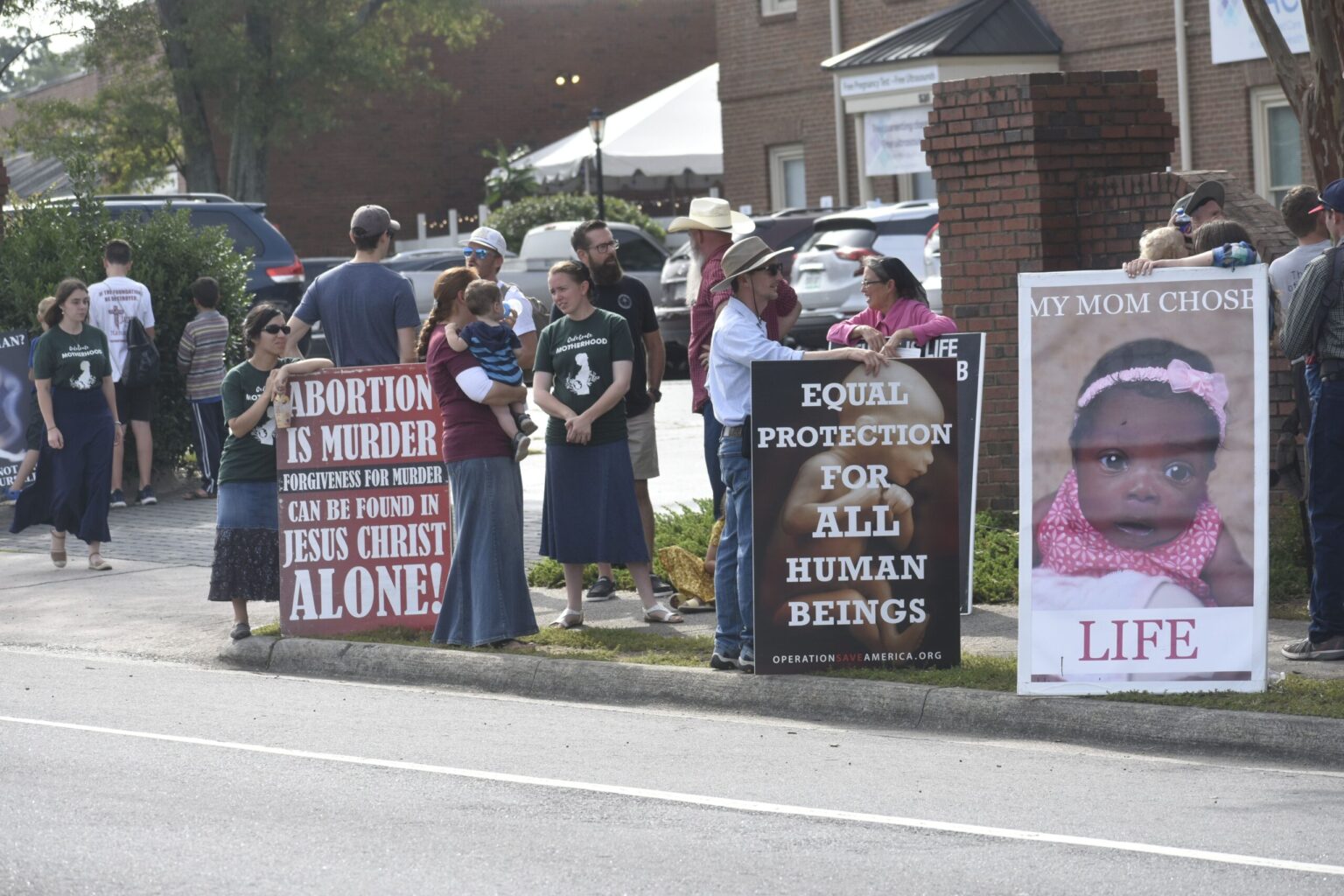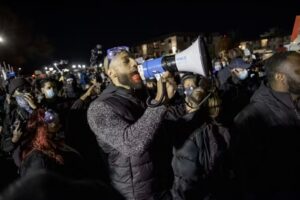5:59
News Story
Anti-abortion ‘abolitionists’ take slavery rhetoric to the next level
The first time Tina Marshall heard anti-abortion protesters call themselves “abolitionists,’” she said she burst out laughing.
Marshall, a Black woman who lives in Charlotte, North Carolina, was counter protesting at an abortion clinic when a mostly white group — save one Black woman — surrounded her and told her they were abolitionists.
“I rolled my eyes and said, ‘Can’t you people ever think of anything original? Do you guys have to steal everything?’” Marshall said.
Anti-abortion demonstrators have told her she hates her own people. She’s seen the mostly white men and women put their fists in the air and say, “Black Lives Matter.”
Marshall started volunteering as a clinic defender, as abortion rights groups call it, about two years ago, so she was unfamiliar with some of the rhetoric around abortion until recently. Much like the rest of America, in her view.
“They’ve been doing this for years, and nobody cared, and it’s only because of Roe now that everybody’s antennas are up,” she said of last year’s U.S. Supreme Court decision that ended the federal right to abortion. “Even before that, I’ve been out here over two years, and nobody cared about all the jeering and heckling of Black women.”
The co-opting of imagery from slavery, the Civil Rights Movement and other Black experiences to argue against abortion goes back more than a century, depending on who you ask, but the so-called “abolitionist” sect of anti-abortion groups has gained more momentum in political circles and state legislatures in recent years. With statistics showing higher rates of abortion by Black people in some states and the Black community’s reverence to culture and religion, it’s easy to see why such anti-abortion groups are focusing on African Americans.
William Hart, a professor of religious studies at Macalester University in Minnesota, told States Newsroom in an email that from his research, most Black Christians and non-Christians tend toward cultural conservatism, but they don’t typically have strong feelings against abortion. Those who do think abortion should be illegal are often viewing it from the historical belief that family planning and abortion were forms of Black genocide, Hart said.
“The anti-abortion religious right is appealing to Blacks on religious grounds because they understand that Blacks are susceptible to the argument even if their reasons diverge,” he said.
Activists have also argued over how civil rights icon the Rev. Dr. Martin Luther King Jr. would feel about abortion if he was alive today. King’s niece, Alveda, has said she thinks he would be anti-abortion. Others point to his quotes about the importance of family planning to say he was an advocate of reproductive rights.
The slavery comparison has historically been used by both sides of the abortion debate, according to research published in 1994 by Professor Debora Threedy, who is now retired. While anti-abortion groups use the comparison as a civil rights argument, harkening back to the days when slaves were widely viewed as less valuable human lives, abortion rights activists point to the implied slavery of not having a choice whether or not to give birth to a child, sometimes referring to it today as “involuntary servitude” and invoking “Black Lives Matter” to argue for bodily autonomy.
Threedy said the comparison to slavery in particular allows people to argue from the side of moral certainty, because nearly everyone today would agree that slavery was wrong then and wrong now.
“From where we stand now, on the slavery debate, we’re all on the side of the angels,” Threedy said. “By co-opting that rhetoric, what you’re saying is, ‘I’m on the side of the angels. They’re not on the right side of history, they’re not occupying the moral high ground — I am.’”
While the terminology is invoked on both sides of abortion politics, the anti-abortion activists who call themselves abolitionists have adopted it more as an identity over the past decade, and it has caused rifts among groups with similar goals.
Abortion abolitionists draw comparisons to history
At a recent conference hosted by Operation Save America, an extreme anti-abortion and anti-LGBTQ organization with a history of physically blockading abortion clinics around the country, those rifts were openly discussed. The group’s director, Jason Storms, opened the conference on July 17 at Pray’s Mill Baptist Church in Douglasville, Georgia, by stating his organization would no longer associate with T. Russell Hunter, the leader of Abolish Human Abortion.
Hunter has frequently taken to Facebook, YouTube and other video platforms to imply or directly state that groups like Operation Save America, Students for Life of America, Live Action and others don’t always advocate from an exclusively “abolitionist” standpoint and are not as committed to ending abortion as he is.
Those who call themselves abortion abolitionists, such as Hunter, see that as an example of the difference between their views and that of the “pro-life” groups, which generally oppose criminal penalties for the pregnant person.
On a recent episode of a podcast called The Serrated Edge, Hunter said he researched abolition in the context of slavery when he was in graduate school, and he saw parallels between the immediate abolitionists and those who opposed slavery but were in favor of more gradual, incremental approaches to ending it. To him, the abolitionists took a more biblical stance by calling the practice a sin and calling on the nation to repent.
“I thought, these (abolitionists) are amazing, what they’re doing,” Hunter said. “They could’ve been anything, and instead, they saw the plight of their neighbors on these transatlantic vessels … and they decided to give themselves to that because they saw those men as their neighbors.”
The two sides of the anti-abortion movement have clashed more in recent years over legislation that would eliminate abortion entirely without any exceptions, including to save the life of the pregnant person, and would attach criminal penalties for the person who sought the abortion, which in some states would include the death penalty.
An “abolish abortion” bill introduced in the Louisiana legislature crafted in partnership with the Foundation to Abolish Abortion in 2022 did not advance after opposition from abortion rights groups as well as anti-abortion organizations, including the Louisiana Family Forum and Louisiana Right to Life. In Idaho, Rep. Heather Scott has introduced a similar bill for three years in a row, but it has not advanced to the House State Affairs Committee. Rep. Brent Crane, who is chairman of the committee, said in 2022 that he would not give a hearing to an “extreme” bill that would put a pregnant person on trial for murder.
During a panel discussion at Operation Save America’s conference in July, Storms was joined by six other men to talk about abolition versus incrementalism in approaches to ending abortion, and said his group staunchly believes in criminal penalties for those who seek out the procedure but shied away from labeling the group as abolitionist or “pro-life.”
Zach Conover, communications director of the national organization End Abortion Now, was also a panelist, and he described the failure of a similar bill his group sponsored in 2019 in Arizona as a result of the National Right to Life group’s opposition to it in a letter signed by more than 70 of its chapter members. He also referenced the Louisiana bill.
“What happened in Louisiana should’ve been national news,” Conover said to the panelists. “It was really the first time that the pro-life establishment had shown their cards to that extent.”
Gabriel Rench, a member of the extremist Christ Church in Moscow, Idaho, also compared abortion to slavery, saying if churches in America had taken a stand against slavery, the Civil War would never have happened.
“We ended slavery through the blood of people instead of through the blood of Christ. When you have a massive cultural sin like slavery in America, you end it through the gospel, you don’t end it through a war,” Rench said during the discussion. “We need to end abortion, which is awful — way worse than slavery, by the way. The slave trade had four, five million slaves max in America? And 600,000 people died. How much has abortion killed?”
According to historians, at least 12.5 million men, women and children were captured and enslaved from Europe and Africa between 1526 and 1857, and 10.7 million were taken to North and South America. That doesn’t include the unknown numbers of people who did not survive the journey on tightly packed ships across the ocean.
Historians say a little more than 300,000 slaves were brought to the United States.
The Centers for Disease Control and Prevention reported about 1.3 million abortions per year between 1980 and 1997, after which the numbers dropped to less than 650,000 per year since 2013.
‘They’re trying to hitch them together’
Amanda Roberti, an assistant professor of political science at San Francisco State University, has researched the rhetoric of abortion politics for more than a decade. She said the civil rights language is often invoked as one of many strategies to capture more audiences, as any cultural advocacy movement would do. But it doesn’t mean every group will take the same approach at the local, state and national levels.
“There is a widespread and widely cast approach going on here, but that is something that social movements can do, especially when they’re multi-faceted like the anti-abortion movement is,” Roberti said. “They have an overarching goal of the end of abortion, but I think there are other groups that have slightly different tactics and what they want to pursue.”
Anti-abortion groups have also used the names of feminist leaders from history along with the names of Black activists. In 2011, U.S. Congressional representatives considered a bill titled the “Susan B. Anthony and Frederick Douglass Prenatal Nondiscrimination Act,” to impose criminal penalties for abortions that were performed based on the sex or race of the child. It’s unclear to historians whether Anthony, an early feminist leader, or Douglass, a slavery abolitionist, were against abortion.
“There’s a whole psychology behind it, because they’re trying to usurp a tragic historical fact and rise abortion to that level, they’re trying to hitch them together,” Roberti said.
‘Black women are the most marginalized’
Mandisa Thomas, a Black woman who lives in Atlanta and volunteers with an organization called We Engage, went to counterprotest at a local abortion clinic when Operation Save America held its conference in July. Abortion is banned after six weeks of pregnancy in Georgia, but members of the anti-abortion group gathered outside A Preferred Women’s Health Center just outside Atlanta during the morning hours that week and attempted to stop individuals from going into the clinic, using microphones with amplified speakers to shout religious messages encouraging the patients not to go through with their appointments. Many of the patients who came to the clinic one morning were Black women.
Thomas said she has often heard the abolitionist language from anti-abortion protesters, and she finds it insulting.
“The fact that they think they are being abolitionists is offensive, because they’re not being liberating at all,” Thomas said. “It really undermines the movements of people who did sacrifice their lives to make sure that all of us do have the freedom of choice, especially when it comes to reproductive choice and reproductive health.”
Marshall, who founded the Black Abortion Defense League in North Carolina, was also at the Atlanta clinic in July. Marshall said she started her organization because she didn’t see many Black people on the abortion rights side.
“I just thought, being a Black woman who had an abortion so many years ago, there’s a common language that we can speak, Black person to Black person,” Marshall said. “Black women are the most marginalized if you ask me. Nobody loves Black women except for other Black women, and sometimes we hate each other too. We’re an easy target because nobody wants to jump up to really save us.”
According to data from the Centers for Disease Control and Prevention, as of 2020, 39% of abortions in the United States were among non-Hispanic Black people, while 33% were among non-Hispanic whites, and 21% were Hispanic. In states across the South, such as Alabama, Mississippi and Georgia, more than twice as many abortions occurred among Black people in 2020 than among white people. In all three states, the poverty rate among Black people is also two to three times higher than among whites, and maternal mortality rates among Black women are higher than anywhere else in the country. Anti-abortion groups often target clinics in communities where a majority of the population is Black, typically in the South, for protests.
The disproportionate rates of abortion by race in some states are often cited on websites and in the literature of anti-abortion groups as a crisis to be addressed. Right to Life of Michigan has an entire page on its website titled “Black Abortions By the Numbers.” Focus on the Family cites the rate of abortions among Black women on its website as well.
But a 2022 poll by the Pew Research Center found that 59% of white respondents and 68% of Black respondents supported abortion to be legal in most or all cases.
That disparity in support could be one reason for trying to persuade communities of color to turn against abortion rights, said Grace Howard, an assistant professor of political science at San Jose State University. But on the other hand, Howard said tactics like the billboard could also be directed at white people like herself, to motivate her to action.
Some groups have paid for billboard advertisements that make race-based arguments around abortion, such as one in New York City in 2011 with a picture of a young Black girl that said, “The most dangerous place for an African American is in the womb.”
The billboard was paid for by an anti-abortion group in Texas called Life Always and approved by the group’s founding board member Stephen Broden, a Black pastor in Dallas. Broden said at the time in a statement that, “Our future is in jeopardy as a genocidal plot is carried out through abortion.”
The billboard was placed in a largely white community to garner the most attention, Broden said.
For some, reproductive justice is the answer
Roberti said the history of violence against Black women should also be considered when people use language related to slavery and civil rights. Research shows women who were enslaved were often raped and forced to bear children that could then be sold to other slaveowners. They were also subject to forced sterilization and other reproductive control measures.
“Black women have been subject to a lot of reproductive violence, so in a way they’re (anti-abortion activists) tapping into an argument that is real, but then applying it to a policy output that’s not going to provide any kind of justice,” Roberti said.
Howard is also a scholar of the reproductive justice movement, a social justice concept formed by a group of Black women in 1994 that looks beyond the statistics and demographics of abortion and works to strengthen the infrastructure of social supports around marginalized communities. That includes increasing access to contraception, adequate health care during and after pregnancy, reducing poverty rates and other measures that would increase quality of life and provide real choice, according to Sister Song. Howard said it’s a solution that could lower the number of abortions obtained in the U.S. each year, including among communities of color.
“For some people, they are having abortions because they know they won’t be able to raise this child the way they want to,” Howard said. “If you want fewer abortions, then a social safety net might change things, if someone knows they might be able to care for their child with dignity.”
Our stories may be republished online or in print under Creative Commons license CC BY-NC-ND 4.0. We ask that you edit only for style or to shorten, provide proper attribution and link to our website. AP and Getty images may not be republished. Please see our republishing guidelines for use of any other photos and graphics.




